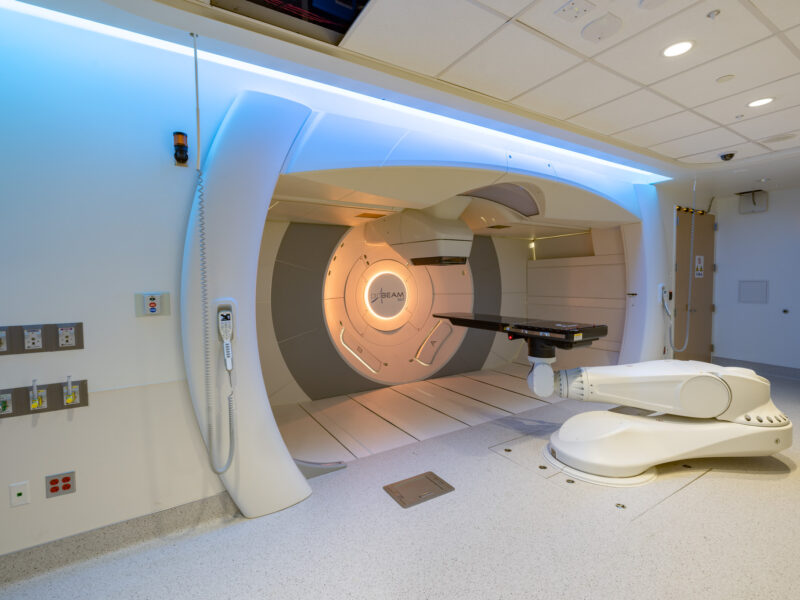A Single-Dose Cancer Immunotherapy via Gene Transfer
A Single-Dose Cancer Immunotherapy via Gene Transfer https://pediatricsnationwide.org/wp-content/themes/corpus/images/empty/thumbnail.jpg 150 150 Mary Bates, PhD Mary Bates, PhD https://secure.gravatar.com/avatar/c6233ca2b7754ab7c4c820e14eb518c8?s=96&d=mm&r=g- July 14, 2022
- Mary Bates, PhD
Researchers at Nationwide Children’s Hospital report proof-of-principle results for a new gene therapy cancer treatment. The off-the-shelf, single-dose immunotherapy serves as an alternative to CAR-T therapy and can be engineered to be on-demand.
T cells redirected to cancer cells either via a chimeric antigen receptor (CAR-T) or a bispecific molecule have been game-changers in treating certain leukemias and lymphomas. Even so, there are challenges associated with these treatments; CAR-T cells are expensive and cumbersome to manufacture, for instance, while bispecifics require long infusions.

Tim Cripe, MD, PhD
Timothy Cripe, MD, PhD, chief of the Division of Hematology and Oncology at Nationwide Children’s and lead author of the new study, says his group was inspired by the success that the Nationwide Children’s neuromuscular group has had using systemic adeno-associated virus (AAV) gene therapy.
“We thought we could use this technology to express a therapeutic product—not just replace a gene but instruct cells to make a whole new gene,” says Dr. Cripe.
The team designed recombinant AAV vectors to express a therapeutic protein into the bloodstream following a single intravenous injection. They tested the gene therapy in mice expressing human immune cells, where they found it could attack malignant B cells in several ways.
In addition to requiring only one dose, this therapy also enables sustained pressure on the target cancer cells, resulting in therapeutic expression for more than one year. Indeed, Dr. Cripe points out that in the mice, tumors shrank slowly, generally over weeks to months.
“This finding illustrates the necessity of consistent, long-term expression of cancer therapy in order to chip away at the tumor and continue to put pressure on the tumor cells and not let it grow back,” he says.
After confirming that the gene therapy did not cause any adverse effects in the mice, Dr. Cripe and his colleagues devised a switch that would turn the therapy on or off on-demand. Dr. Cripe says this kind of technology might be more appropriate for relapsing diseases, such as rheumatological disorders, where short-term or intermittent therapy is preferable.
Dr. Cripe, who is also a professor of pediatrics at The Ohio State University College of Medicine, says his team is currently exploring their gene therapy approach in a wider range of cancers.
“We are starting to work on developing a whole pipeline of parallel kinds of gene therapies that will produce other therapeutics that would go after different kinds of cancers,” he says.
With help from Vironexis, a company that Dr. Cripe cofounded, the researchers are hoping to launch a clinical trial of the gene therapy by the end of next year.
Reference:
Cripe TP, Hutzen B, Currier MA, Chen CY, Glaspell AM, Sullivan GC, Hurley JM, Deighen MR, Venkataramany AS, Mo X, Stanek JR, Miller AR, Wijeratne S, Magrini VJ, Mardis ER, Mendell JR, Chandler DS, Wang PY. Leveraging Gene Therapy to Achieve Long-Term Continuous or Controllable Expression of Biotherapeutics. Science Advances. 2022 Jul 13.
Image credits: Adobe Stock (header); Nationwide Children’s (Dr. Cripe)
About the author
Mary a freelance science writer and blogger based in Boston. Her favorite topics include biology, psychology, neuroscience, ecology, and animal behavior. She has a BA in Biology-Psychology with a minor in English from Skidmore College in Saratoga Springs, NY, and a PhD from Brown University, where she researched bat echolocation and bullfrog chorusing.
-
Mary Bates, PhDhttps://pediatricsnationwide.org/author/mary-bates-phd/December 27, 2016
-
Mary Bates, PhDhttps://pediatricsnationwide.org/author/mary-bates-phd/
-
Mary Bates, PhDhttps://pediatricsnationwide.org/author/mary-bates-phd/
-
Mary Bates, PhDhttps://pediatricsnationwide.org/author/mary-bates-phd/






